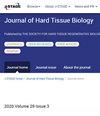IFITM3 Promotes Osteogenic Differentiation of Human Dental Pulp Stem Cells by Modulating MAPK Signaling
IF 0.4
4区 医学
Q4 ENGINEERING, BIOMEDICAL
引用次数: 0
Abstract
Dental pulp stem cells (DPSCs) invoke wide interest due to their roles in in dentin regeneration and repair, and more research is required to illustrate the molecular basis. In this study, we induced osteogenic differentiation in human DPSCs to investigate the role of interferon-induced transmembrane (IFITM) family in osteogenic differentiation. Our results demonstrated that genes of the IFITM family, IFITM1, IFITM3, and IFITM5 were upregulated during the osteogenic differentiation of DPSCs. Loss-of-function and gain-of-function assays indicated that IFITM3 knockdown suppressed osteogenic differentiation, assessed by the reduction of alkaline phosphatase (ALP) activity, nodule mineralization, and the expressions of several osteogenic differentiation-associated genes; in contrast, IFITM3 overexpression increased ALP activity, nodule mineralization, and the expressions of osteogenic differentiation-associated genes. Further investigation revealed that IFITM3 was involved in the regulation of mitogen-activated protein kinase (MAPK) signaling during osteogenic differentiation, and pharmacological inhibition of both ERK and p38 suppressed the effects of IFITM3 overexpression in osteogenic differentiation. These results suggest that IFITM3 promotes osteogenic differentiation of DPSCs by regulating MAPK signaling. Our findings enhance the existing knowledge on the role of IFITM family in osteogenic differentiation and the molecular basis of IFITM3.IFITM3通过调节MAPK信号传导促进人牙髓干细胞成骨分化
牙髓干细胞(DPSCs)因其在牙本质再生和修复中的作用而引起了广泛的关注,需要更多的研究来阐明其分子基础。本研究通过诱导人DPSCs成骨分化,探讨干扰素诱导跨膜(IFITM)家族在成骨分化中的作用。我们的研究结果表明,IFITM家族、IFITM1、IFITM3和IFITM5基因在DPSCs成骨分化过程中表达上调。功能丧失和功能获得试验表明,IFITM3敲低抑制成骨分化,通过降低碱性磷酸酶(ALP)活性、结节矿化和几个成骨分化相关基因的表达来评估;相反,IFITM3过表达增加了ALP活性、结节矿化和成骨分化相关基因的表达。进一步研究发现,IFITM3参与成骨分化过程中丝裂原活化蛋白激酶(MAPK)信号的调控,药理抑制ERK和p38均可抑制IFITM3过表达对成骨分化的影响。这些结果表明IFITM3通过调节MAPK信号传导促进DPSCs的成骨分化。我们的研究结果加强了对IFITM家族在成骨分化中的作用以及IFITM3的分子基础的现有认识。
本文章由计算机程序翻译,如有差异,请以英文原文为准。
求助全文
约1分钟内获得全文
求助全文
来源期刊

Journal of Hard Tissue Biology
ENGINEERING, BIOMEDICAL-
CiteScore
0.90
自引率
0.00%
发文量
28
审稿时长
6-12 weeks
期刊介绍:
Information not localized
 求助内容:
求助内容: 应助结果提醒方式:
应助结果提醒方式:


